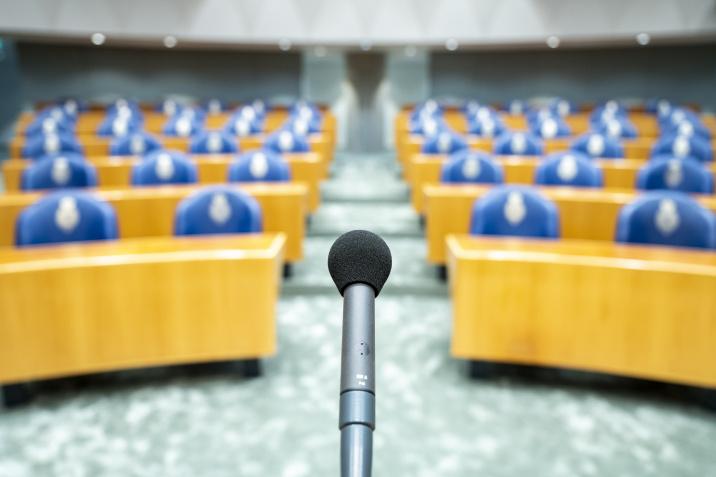The debate
Debates are held according to an established pattern. First, the floor is given to the spokespersons from the political groups in the House of Representatives. The minister or state secretary replies. This is called the first stage. In most cases, not all the questions have been answered yet and the first stage is therefore followed by a second stage in which the MPs are given the floor again, and the member of the cabinet replies. If questions remain which have not been answered satisfactorily, a third stage may follow.
Interruptions
During meetings, MPs enter into debate with ministers and state secretaries and if necessary with each other. However, they address the Speaker of the House, not each other directly. Speakers may interrupt one another’s speeches and pose questions, the so-called interruptions. In the Plenary Hall MPs can use the interruption microphones which are located opposite the sabinet section.
Debate formats
- Conclusion of a committee debate on general policy: this is a short debate in which every parliamentary group is allocated two minutes of speaking time, hence earning the name "two-minute debates". MPs generally propose one or more motions in such debates.
- Framework debates: many subjects, primarily bills, are dealt with in broad terms in a plenary sitting before being discussed in a committee, for instance in order to determine whether a proposal has sufficient support.
- Thirty-member debate or interpellation: the House calls a minister to account and requests him or her to comment on an important issue.
- Question hour: MPs question members of the cabinet on topical issues.
All public debates in the House of Representatives can be followed live on this website and the weekly question hour is broadcast on NPO1 and NPO politiek.
Question hour

Every sitting week commences with the question hour at 2 pm on Tuesday. MPs have the opportunity to ask oral questions, not more than six per question hour.
First come, first served
The President closes the meeting on Thursday evening at the end of the sitting week by banging the gavel. From that moment, MPs may submit oral questions for question hour up until midday on the following Tuesday. More than 40 questions are submitted for question hour every week. The President of the House selects which questions will be addressed during each question hour and receives advice in this regard from the Secretry-General and clerks of the House of Representatives.
There is only time to deal with topical issues relating to facts that have recently come to light. Moreover, the matter must be of some urgency and importance.
Many questions are dropped, for instance because another MP has already submitted an oral question on the same issue, or because the subject will be discussed shortly or has been discussed recently, in a debate or in writing.
Speaking time
The speaking time available to each MP depends on the type of debate. While the House arranges its affairs and draws up its agenda, the President of the House routinely announces how much speaking time MPs will be granted in a plenary debate. In a thirty-members debate, for instance, speaking time is generally limited to three minutes.
Debates on budget bills
Every year after Prince’s Day, debates are held on the budget for each ministry. The Presidium determines beforehand how much speaking time will be designated to each parliamentary group for the budget debates. Large groups are permitted longer speaking time than small ones. Speaking time is earmarked for the entirety of every budget debate. Each parliamentary group may decide to spend more of their total alloted speaking time on a specific budget bill, for example the budget for the Ministry of Security and Justice, leaving them less speaking time available for other budget bills. MPs are also free to first discuss a budget bill in a committee meeting . The committee sets the permitted speaking time for such meetings during the procedural meeting beforehand.
Committee debate on general policy
Another one of the most common types of meetings in the House of Representatives is the committee debate on general policy, which comprises a meeting of a specialised committee. These committees also allocate speaking time to each parliamentary group during their procedural meeting. In the event of fewer speakers, the chairperson may enforce speaking time limits less rigidly. If the committee elects to conclude the debate in the Plenary Hall, every parliamentary group will have two minutes of speaking time to present motions.
Speaking time does not include interruptions
Speaking time is limited beforehand to a certain number of minutes, but does not include interruptions and answers to interruptions. This means that a debate can continue for a much longer time than estimated beforehand.